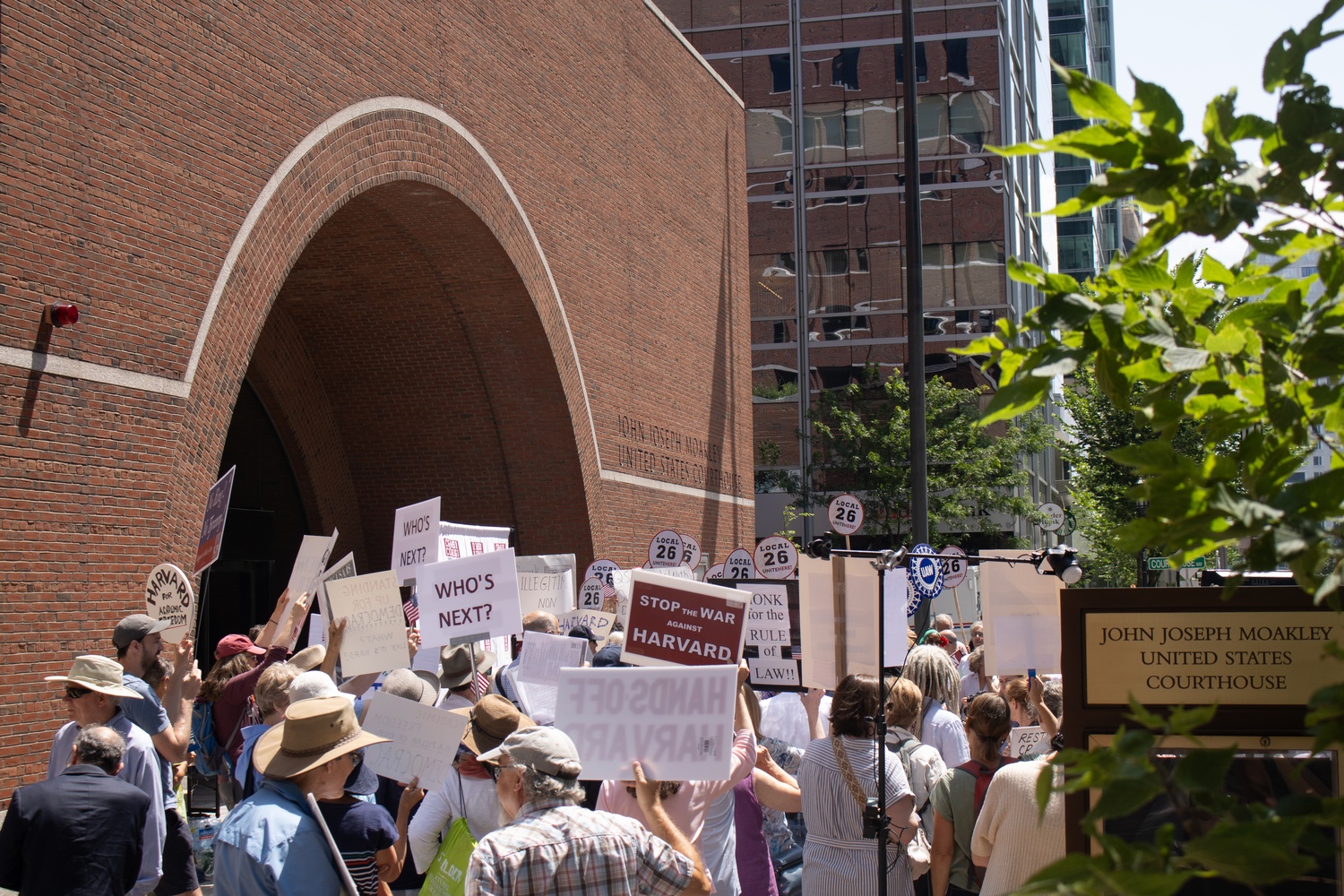
News
Summers Will Not Finish Semester of Teaching as Harvard Investigates Epstein Ties

News
Harvard College Students Report Favoring Divestment from Israel in HUA Survey

News
‘He Should Resign’: Harvard Undergrads Take Hard Line Against Summers Over Epstein Scandal

News
Harvard To Launch New Investigation Into Epstein’s Ties to Summers, Other University Affiliates

News
Harvard Students To Vote on Divestment From Israel in Inaugural HUA Election Survey
The Trump Lawsuit You Haven’t Heard of Is the Real Game Changer
On Wednesday, a federal court issued a ruling confirming what has long been clear: The Trump administration’s attacks on Harvard flagrantly violate the Constitution and laws of the United States, and they cannot legally continue. The historic ruling by United States District Judge Allison D. Burroughs sends a powerful message to everyone concerned about the many attacks on our democracy coming from this White House: It is well worth standing up to such wanton abuses of federal power.
But Trump did not just lose one lawsuit against Harvard. He lost two. And crucially, this fact will complicate any potential “deal” the Harvard Corporation might still wish to reach with the federal government.
One of those lawsuits — filed on April 21 by the President and Fellows of Harvard College, Harvard’s formal corporate name — has received most of the press coverage. This makes sense, as the question of whether the University will fight or capitulate to the administration’s illegal demands has been widely recognized as a bellwether for the future of American higher education.
But it is the victory in the other suit that should make any such capitulation far less likely. That other case was filed on April 11, before Harvard’s, by the American Association of University Professors and its Harvard faculty chapter, which we help lead. We were soon joined by the United Auto Workers, which represents Harvard’s graduate teachers and non-tenure-track faculty. And in this week’s ruling, we won a judicial order identical in scope to Harvard’s, mandating not only the restoration of all frozen funds but also prohibiting any future unconstitutionally retaliatory funding cuts against our community.
Critically, that order in our lawsuit is enforceable directly by our organizations. This means if the Trump administration wants to vacate the judge’s ruling, it must defeat that ruling on appeal before another set of judges. But it cannot squirm its way out of complying with Judge Burroughs’ order by coercing the Harvard Corporation into dropping its lawsuit, coughing up $500 million, and agreeing to increased restrictions on research, teaching, and campus life. Because even if the University were to abandon its case, the entire judicial order blocking the Trump administration’s unlawful actions would remain fully and completely in effect, and enforceable by us — the teachers, researchers, and students who make this University work and who are central to fulfilling its educational mission.
Those teachers, researchers, and students were essential to both lawsuits. The court’s ruling makes repeated and detailed reference to the many declarations filed in the case by some twenty AAUP and UAW members — a number of whom, we should stress, work at Harvard without the protections of tenure. Our colleagues spoke out bravely and at considerable personal risk about the irreparable harms they have suffered as a direct result of the federal government’s arbitrary and capricious attacks on their academic freedom and livelihoods. As Judge Burroughs wrote, “it is their names that appear directly on the face of the grant agreements, their labs that receive the funding, and their research that is eliminated when funding is discontinued.” Credit for this win is theirs as much as anyone’s.
Of course, this fight is bigger than Harvard — and it isn’t over. As the court indicated in its ruling, “the government-initiated onslaught against Harvard was much more about promoting a governmental orthodoxy in violation of the First Amendment than about anything else, including fighting antisemitism.” The Trump administration’s plan to use these tactics against higher education nationwide will not be defeated by this one lawsuit, which the government has already vowed to appeal.
It will be defeated instead only if all who understand, care about, and seek to defend the core values of higher education come together to make clear to each other, to our leaders, and to the broader public why those values need safeguarding. Our organizations, like our University, are no more than the people who make up our community. When we filed our lawsuit, we grounded it in the detailed, often gripping testimonies of our members to ensure that the teaching, research, and educational mission of the University would be the central values at stake in this legal battle. This week’s ruling is an important vindication of that core mission. And in winning our own independently enforceable judicial order, our organizations have helped protect our community’s essential rights from being bargained away in any backroom deal.
Kirsten A. Weld is a professor of History and is the president of the AAUP-Harvard Faculty Chapter. Andrew Manuel Crespo is the Morris Wasserstein Public Interest Professor of Law at Harvard Law School and general counsel for the AAUP-Harvard Faculty Chapter.
Want to keep up with breaking news? Subscribe to our email newsletter.

